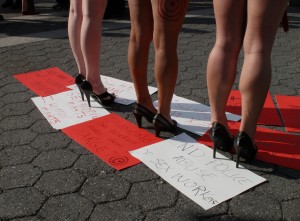The Best Practices Policy Project (BPPP), Desiree Alliance, and SWOP NYC are calling on sex workers rights advocates and allies to join us in reporting the human rights abuses experienced by sex workers, people in the sex trades, people profiled as sex workers or impacted by anti-sex work policing and policies, and related communities. The U.S. will soon be reviewed by the United Nations (U.N.) Human Rights Council on its human rights record in a process referred to as the Universal Periodic Review (UPR). We are submitting a report to the U.N. and the U.N. needs to hear from you. Through this process, we create awareness before the international community, media outlets, other government officials, U.N. Human Rights Council members, and other stakeholders on the pressing issues facing the community. This is an important tool for pressuring the government to make changes.
To write this report, we need to hear from those who have directly experienced human rights violations and we are reaching out to folks until August 20, 2014. We hope to collect testimony and data from sex workers and related communities that we can include in our report. If there are specific instances of rights violations, you wish to share with us, we will incorporate these into the report. First-hand accounts of violations people have experienced are what the UN needs to hear most. Also know that these accounts can be anonymous in the report and that we will share a draft of the report with you so you can check that no identifying details are included.
If you are interested in participating, please email us at BPPP (bestpracticespolicyproject “at” gmail.com) or directly to one of our team including J.Kirby, Kat Thomas, Penelope Saunders, Darby Hickey, Cris Sardina and Kate D’Adamo. We are happy to help people and groups understand what the UPR is and how the process works, and we would value learning about your experience working to advocate for rights at the U.N. to increase our collective knowledge. We can also assist with drafting testimony and organizing data. We will draft the report and send it to you or your organization’s representative before submitting to ensure that we correctly documented your experiences.
The Human Rights background: The U.S. is obligated to uphold everyone’s human rights, including the rights to housing, education and healthcare; the right to be free from arbitrary arrest, due process violations, and invasions of privacy; the right to be free from torture and inhumane treatment; as well as rights related to the US obligation to eliminate racial discrimination.
It is well documented that the U.S. violates these rights on a routine basis when it comes to sex workers, or people that police, social workers or service providers profile as sex workers. The UPR provides a space for the world to hear about how the has U.S. violated human rights over the past four years.
In 2010, BPPP and Desiree Alliance submitted its first shadow report to the U.N. Human Rights Council outlining human rights violations, e.g., police abuse and targeting, institutionalized discrimination, lack of legal protection, and violence ignored by the local governments. As a result of the report and advocates speaking out in Geneva before the U.N. Human Rights Council, the US adopted Recommendation 86, which states that the US agrees to:
“Undertake awareness-raising campaigns for combating stereotypes and violence against gays, lesbians, bisexuals and transsexuals, and ensure access to public services paying attention to the special vulnerability of sexual workers to violence and human rights abuses.”
This was the first time the U.S. agreed to address sex workers’ rights violations directly at the U.N. However, we have seen very little change since the adoption of the recommendation. Sex workers continue to experience violence, stigma, discrimination, and targeting, especially at the hands of the police. We want to hold the U.S. Government responsible for not fulfilling its obligations in accordance with Recommendation 86. We want to further highlight issues that have risen in the last four years that continue to go unreported.


Leave Your Response